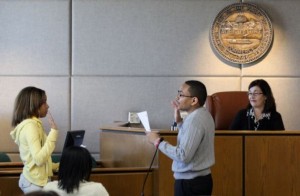Youth Courts 101: A How-to Video Primer and Manual
 Greg Berman, director of the Center for Court Innovation in New York City gives an excellent overview of how youth courts work in this video interview with Leonard Witt of the JJIE.org. They are completely teen driven with teens as judges, attorneys and juries who hear actual cases either referred by the police or the courts. Each teen judge, attorney or juror gets 30-hours of training and has to pass a “bar exam” to be able to serve.
Greg Berman, director of the Center for Court Innovation in New York City gives an excellent overview of how youth courts work in this video interview with Leonard Witt of the JJIE.org. They are completely teen driven with teens as judges, attorneys and juries who hear actual cases either referred by the police or the courts. Each teen judge, attorney or juror gets 30-hours of training and has to pass a “bar exam” to be able to serve.

Greg Berman
In the youth courts Berman’s center helps oversee, the kids running the courts come from a variety of backgrounds, so the offenders are being judged by their real peers. In fact, kids who once came before the court often come back later to serve as judges, attorneys and jurors, so Berman says it can be “a life changing experience.”
Kids sent to the court have already admitted guilt and are at the mercy of their peers to design the sanctions that will be administered.
The kids ask great questions, Berman says, and have “great BS detectors.” They listen to the individual cases and then the jury delivers a sanction that, according to Berman, tends to emphasize restoration.
The outcome might be a letter of apology, public service work or links to anger management. It turns peer pressure on its head, he says, making it a positive rather than a negative and that is the nub of the youth court idea.
Watch the video below for more details. You can download the manual on Recommended Practices for Youth Courts published by the Center for Court Innovation.
Newsfeed Archives
elsewhere
- An interview with Karlan Sick, Board President
- BOOKS CAN HELP INCARCERATED TEENS SUCCEED
- Books Through Bars
- Distribution to Underserved Communities Library Program
- Juvenile Justice Information Exchange
- Life Lessons Through Literacy for Incarcerated Teens
- Passages Academy Libraries
- Passages Academy Schools
- Read This
- What's Good in the Library?
- Women and Prison




